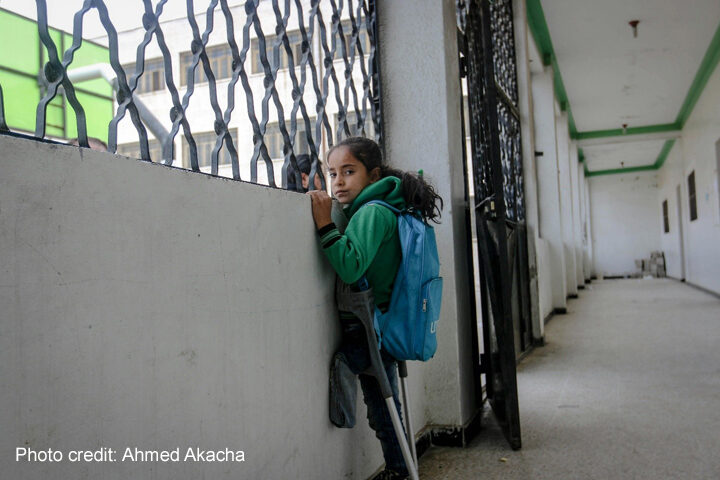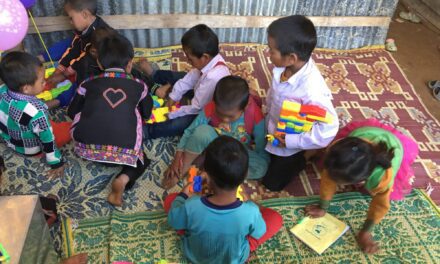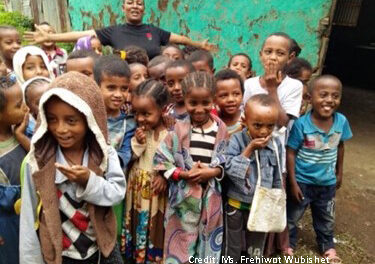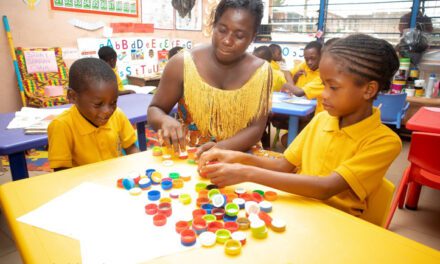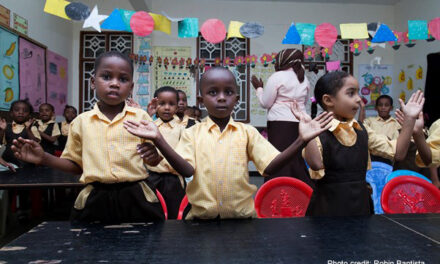This blog was written by Aanchal Kapur a researcher and writer on Early Childhood Education, equity, and systems change across Africa, Asia and the Middle East.
Early childhood education (ECE) in the Global South is under siege from a “polycrisis” – multiple global shocks that converge and compound each other. Climate disasters, armed conflicts, mass displacement, pandemics like COVID-19, and economic instability are overlapping and intensifying. These crises have already reversed gains in young children’s well-being: the COVID-19 pandemic alone pushed over 100 million additional children into poverty, and disrupted pre-primary education for more than 180 million children at its peak. UNICEF warns that the world has entered a “new and intensifying era of crisis for children”, where climate change, conflict, and economic instability are closely interconnected, and stresses that upholding children’s rights will require rethinking and strengthening systems rather than business-as-usual approaches.
Young children’s development is particularly vulnerable in such turmoil. Families face droughts or floods that destroy pre-schools, violence that forces them to flee, disease outbreaks that shut down childcare services, and inflation that makes basic learning materials unaffordable. Children’s healthy development is also threatened by environmental hazards and lead exposure in the home can cause developmental delays and reduce school readiness. During COVID-19, many pre-schools closed and never reopened. At least 40 million children worldwide missed early childhood education in their critical pre-school year, and 35 million were still affected by national school closures in December 2020, with more than 60 countries not fully reopening pre-primary schools by mid-2021. Those already vulnerable before the pandemic fell even further behind. Yet discussions about the youngest children in crisis remain limited -Humanitarian programming for the early years often “falls through the cracks” on the periphery of emergency responses. How can we safeguard early learning when crisis becomes the “new normal”?
Why fragmented approaches fall short
Traditionally, responses to early childhood challenges have been fragmented and project-based, tackling one issue at a time. These siloed efforts – though well-intentioned – fail to address the overlapping nature of today’s crises. Protracted emergencies blur the lines between “relief” and “development,” boxes, and one-off interventions are insufficient when shocks cascade. For example, temporary pre-schools in refugee camps are crucial, but they will fall short if not paired with health care, nutrition, psychosocial support and efforts to rebuild education systems. A standalone nutrition project might show short-term gains, but without addressing underlying poverty and food insecurity, those benefits will not last.
In many countries, ECE systems were underfunded and fragmented even before the polycrisis. Piecemeal interventions cannot build the resilient, equitable early education that young children need. In short, fragmentation fosters fragility. If we continue with ad hoc, siloed approaches, we risk losing an entire generation’s future to compounding crises.
What is systems thinking?
“Systems thinking” means seeing the big picture and understanding how all parts of an ecosystem interact. In ECE, it means viewing the early childhood landscape as a connected whole – recognising how education links with health, nutrition, social protection, family support, workforce development and governance. Changes in one part of the system affect others, often through feedback loops that can create vicious or virtuous cycles. A small, well-targeted adjustment can yield outsized effects if it hits a leverage point. Systems thinking encourages us to see the forest, not just the trees – shifting focus from isolated fixes toward sustainable, system-wide solutions.
By reframing ECE as an interconnected system rather than a collection of programmes, we can identify leverage points and blind spots. This perspective helps explain why an intervention that succeeds in a pilot might falter at scale if broader system factors – like teacher training, parental support or financing – aren’t addressed. Ultimately, systems thinking in ECE is about integration and synergy: aligning efforts across sectors so that the whole is greater than the sum of its parts.
Building resilient ECE systems amid crisis
- Coordinate widely and fortify the system: A polycrisis demands a whole-of-system response. ECE must be integrated with efforts in health, nutrition, sanitation, social protection and emergency relief, rather than handled in a silo. This requires education, health, nutrition, child protection and other agencies to share data, resources and plans. It also means strengthening the core foundations of ECE systems: supporting the workforce, maintaining data systems, ensuring good governance and securing sustainable financing. UNICEF emphasises that systems approaches are essential to build resilience. Practically, this could mean disaster preparedness plans to ensure pre-schools are rebuilt quickly after a shock, adaptive learning systems during emergencies (such as community-based or remote models), and continued health and social services so that young children can keep learning despite disruptions.
- Prioritise equity and inclusion: In any crisis, the poorest and most marginalised young children are at highest risk of being left behind – including refugee and displaced children, girls, adolescent mothers, children with disabilities, and those in remote areas. A systems approach puts equity at the centre, directing support to those who need it most rather than assuming help will trickle down. This means identifying underserved communities and removing barriers – fees, distance, language, discrimination – that prevent access to early learning. Crisis responses should explicitly include early childhood needs: for example, setting up child-friendly spaces in refugee camps where young children can play, learn and receive psychosocial support while their parents rebuild.
From crisis to transformation
The polycrisis is daunting, but it also presents an opportunity to transform how we support the youngest generation. Business-as-usual in ECE is a dead end. We can no longer afford to be reactive and fragmented; instead, we must be proactive and systemic.
Young children can be remarkably resilient if they have the right supports. Our responsibility is to ensure that the systems around them are equally resilient. By acting in interconnected, systems-aware ways, we can build early childhood services that deliver for children not only in calm times but also through storms.
In a polycrisis era, applying a systems thinking approach is not just innovative – it is essential to uphold young children’s right to thrive, no matter what challenges the future holds.

